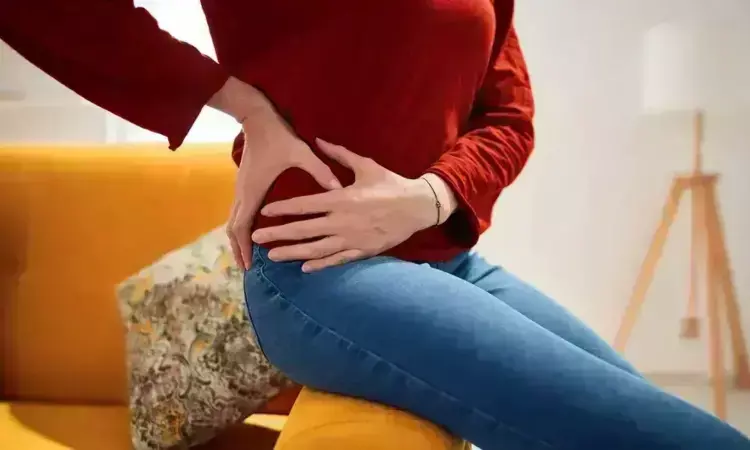- Home
- Medical news & Guidelines
- Anesthesiology
- Cardiology and CTVS
- Critical Care
- Dentistry
- Dermatology
- Diabetes and Endocrinology
- ENT
- Gastroenterology
- Medicine
- Nephrology
- Neurology
- Obstretics-Gynaecology
- Oncology
- Ophthalmology
- Orthopaedics
- Pediatrics-Neonatology
- Psychiatry
- Pulmonology
- Radiology
- Surgery
- Urology
- Laboratory Medicine
- Diet
- Nursing
- Paramedical
- Physiotherapy
- Health news
- Fact Check
- Bone Health Fact Check
- Brain Health Fact Check
- Cancer Related Fact Check
- Child Care Fact Check
- Dental and oral health fact check
- Diabetes and metabolic health fact check
- Diet and Nutrition Fact Check
- Eye and ENT Care Fact Check
- Fitness fact check
- Gut health fact check
- Heart health fact check
- Kidney health fact check
- Medical education fact check
- Men's health fact check
- Respiratory fact check
- Skin and hair care fact check
- Vaccine and Immunization fact check
- Women's health fact check
- AYUSH
- State News
- Andaman and Nicobar Islands
- Andhra Pradesh
- Arunachal Pradesh
- Assam
- Bihar
- Chandigarh
- Chattisgarh
- Dadra and Nagar Haveli
- Daman and Diu
- Delhi
- Goa
- Gujarat
- Haryana
- Himachal Pradesh
- Jammu & Kashmir
- Jharkhand
- Karnataka
- Kerala
- Ladakh
- Lakshadweep
- Madhya Pradesh
- Maharashtra
- Manipur
- Meghalaya
- Mizoram
- Nagaland
- Odisha
- Puducherry
- Punjab
- Rajasthan
- Sikkim
- Tamil Nadu
- Telangana
- Tripura
- Uttar Pradesh
- Uttrakhand
- West Bengal
- Medical Education
- Industry
Breakthrough in Menopause Treatment: Elinzanetant Cuts Hot Flashes and Enhances Sleep, New Trials Reveal

USA: Recent findings from the OASIS 1 and OASIS 2 randomized clinical trials highlight the potential of Elinzanetant as a significant advancement in treating vasomotor symptoms (VMS) associated with menopause. The trials, which involved evaluating Elinzanetant’s efficacy and safety, have demonstrated that this novel treatment could offer substantial relief for women experiencing moderate to severe menopausal symptoms.
In two pivotal Phase 3 clinical trials, Elinzanetant showed statistically significant reductions in the frequency and severity of vasomotor symptoms compared to placebo. Additionally, Elinzanetant notably improved sleep disturbances and menopause-related quality of life while maintaining a favorable safety profile. The findings were published online in JAMA.
Elinzanetant, a selective neurokinin-1,3 receptor antagonist, targets key pathways to regulate body temperature and mood, providing a new option for managing menopause-related vasomotor symptoms such as hot flashes and night sweats. These symptoms can significantly impact the quality of life, affecting daily activities and sleep patterns.
Considering the need for safe and effective nonhormonal treatments for menopausal VMS, JoAnn V. Pinkerton, University of Virginia Health, Charlottesville, and colleagues aimed to evaluate the safety and efficacy of elinzanetant for the treatment of moderate to severe menopausal vasomotor symptoms.
Two randomized, double-blind Phase 3 trials, OASIS 1 and OASIS 2, evaluated the efficacy of Elinzanetant in postmenopausal women aged 40 to 65 years with moderate to severe vasomotor symptoms. OASIS 1 was conducted at 77 sites across the US, Europe, and Israel from August 27, 2021, to November 27, 2023, while OASIS 2 took place at 77 sites in the US, Canada, and Europe from October 29, 2021, to October 10, 2023. Participants received either 120 mg of oral Elinzanetant daily for 26 weeks or a matching placebo for 12 weeks, followed by 14 weeks of Elinzanetant.
The primary outcomes assessed were the mean changes in the frequency and severity of moderate to severe vasomotor symptoms from baseline to weeks 4 and 12, as recorded in the electronic hot flash daily diary. Secondary outcomes included changes in the Patient-Reported Outcomes Measurement Information System Sleep Disturbance Short Form 8b total T score and the Menopause-Specific Quality of Life questionnaire total score from baseline to week 12.
The researchers reported the following findings:
- Eligible participants (mean age, OASIS 1: 54.6 years; OASIS 2: 54.6 years) were randomized to elinzanetant (OASIS 1: n = 199; OASIS 2: n = 200) or placebo (OASIS 1: n = 197; OASIS 2: n = 200). 78.0% and 81.0% completed OASIS 1 and 2, respectively.
- For the elinzanetant and placebo groups, the baseline mean VMS per 24 hours was 13.4 versus 14.3 (OASIS 1) and 14.7 versus 16.2 (OASIS 2).
- Baseline VMS severity was 2.6 versus 2.5 (OASIS 1) and 2.5 versus 2.5 (OASIS 2).
- Elinzanetant significantly reduced VMS frequency at week 4 (OASIS 1: −3.3; OASIS 2: −3.0) and week 12 (OASIS 1: −3.2; OASIS 2: −3.2).
- Elinzanetant also improved VMS severity at week 4 (OASIS 1: −0.3; OASIS 2: −0.2) and week 12 (OASIS 1: −0.4; OASIS 2: −0.3).
- Elinzanetant improved sleep disturbances and menopause-related quality of life at week 12, and the safety profile was favorable.
"Elinzanetant offers the potential as a well-tolerated and effective nonhormonal treatment to meet the unmet needs of many menopausal individuals suffering from moderate to severe vasomotor symptoms," the researchers concluded.
Reference:
Pinkerton JV, Simon JA, Joffe H, et al. Elinzanetant for the Treatment of Vasomotor Symptoms Associated With Menopause: OASIS 1 and 2 Randomized Clinical Trials. JAMA. Published online August 22, 2024. doi:10.1001/jama.2024.14618
Dr Kamal Kant Kohli-MBBS, DTCD- a chest specialist with more than 30 years of practice and a flair for writing clinical articles, Dr Kamal Kant Kohli joined Medical Dialogues as a Chief Editor of Medical News. Besides writing articles, as an editor, he proofreads and verifies all the medical content published on Medical Dialogues including those coming from journals, studies,medical conferences,guidelines etc. Email: drkohli@medicaldialogues.in. Contact no. 011-43720751


